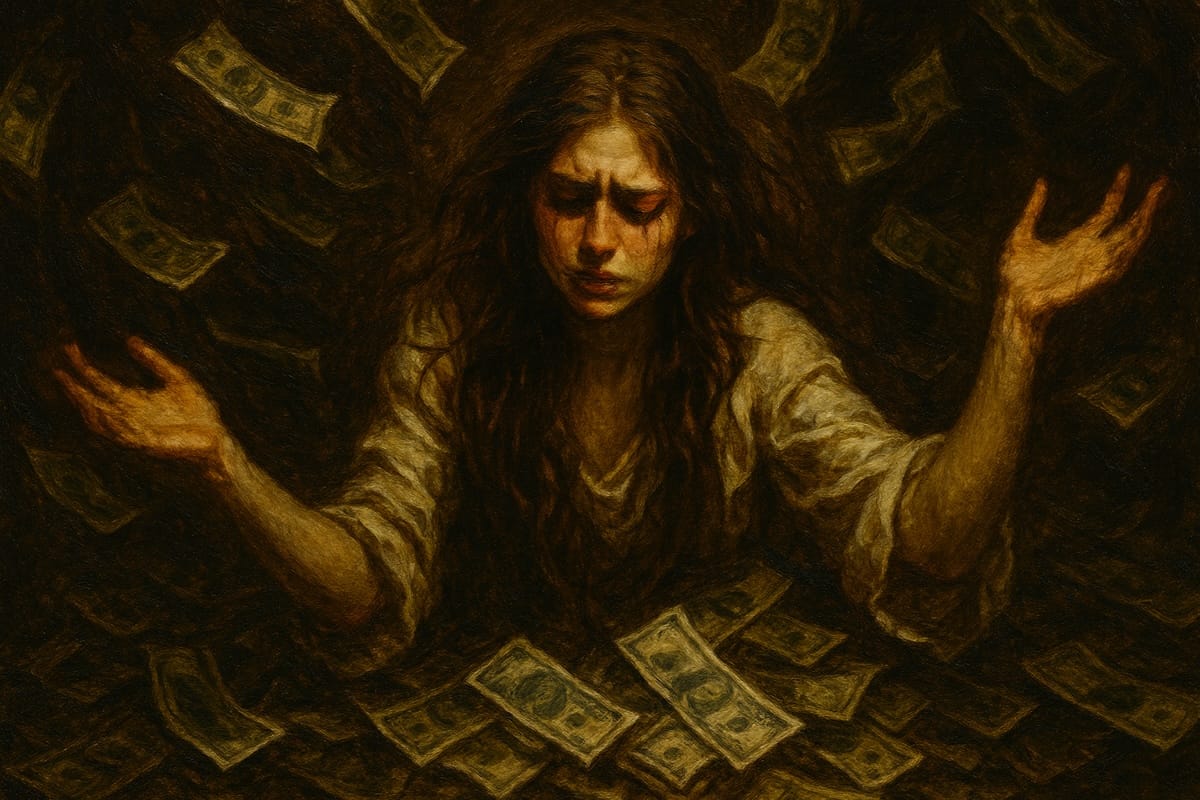And so we come to money, that quiet god who fucks us all without ever taking off its gloves. It doesn't shout; it whispers sweetly while its fingers work your spine like piano keys, each vertebra a note in capitalism's favourite song. Money slides through the world like oil through water, untouchable, unreachable, yet coating everything it passes.
Here's the thing about wealth: it doesn't break down doors anymore. It dissolved them generations ago, replaced them with velvet ropes and algorithms, with credit scores that read like modern psalms of worthiness. Money learned long ago that violence is vulgar; control is an art form best practised with clean hands and lawyers on retainer.
The greatest luxury money purchases isn't the obvious pornography of excess, those tedious accumulations of marble and chrome and desperate attempts at taste. No, the real commodity is blindness. Selective, surgical blindness. The kind that lets you sleep through sirens, scroll past famines, treat poverty like weather you'll never have to walk through. You buy yourself a cocoon of cultivated ignorance, each thread spun from compound interest and tax havens.
With enough zeroes in your account, empathy becomes optional, like heated seats or extended warranties. You don't become cruel; cruelty requires effort, acknowledgement, some vestige of connection. You become something worse: absent. Your conscience goes into a coma so comfortable it might as well be death, yet your body keeps moving, keeps consuming, keeps accumulating.
The wealthy have perfected the art of manufactured distance. They've built entire cities within cities, bubbles inside bubbles, Russian dolls of separation where each layer costs more than the last. Private schools beget private universities beget private clubs beget private everything, until the word 'public' becomes synonymous with failure, with those unfortunate souls who couldn't buy their way out of sharing space with strangers.
In these hermetic chambers, suffering becomes abstract art, something to discuss over wine that costs more than minimum wage. The poor transform into statistics, into 'market corrections', into unfortunate but necessary casualties of economic evolution. They become stories you tell to make your children grateful, cautionary tales wrapped in the soft threat of 'this could be you if you don't work hard enough', as if poverty were a moral failing rather than a systemic feature.
Money has this beautiful talent for laundering responsibility. Every cruel decision gets filtered through bureaucracy, through boards of directors, through the passive voice of corporate communications. Nobody fired ten thousand people; there was a restructuring. Nobody poisoned the water supply; there were budgetary constraints on safety measures. Nobody killed anyone; the market simply decided who deserves to live.
And here's the truly sick part, the twist that would make Midas himself vomit gold: money has convinced us it's innocent. It wears the mask of meritocracy, preaches the gospel of hard work while inheriting its congregation. It funds both the disease and the cure, the protest and the police, the problem and the solution, playing every side with the serene confidence of someone who knows the house always wins.
Wealth whispers its favourite lie: that it's earned, that it's deserved, that it's somehow a reflection of virtue rather than a cocktail of luck, brutality, exploitation and very expensive accountants who know exactly which loopholes taste best. The rich mistake their comfort for righteousness, their privilege for providence, their lottery tickets for destiny.
But perhaps the most exquisite perversion is how money makes us all complicit. We worship at its altar even as it grinds us into dust. We defend billionaires we'll never meet, protect systems that devour us, vote for our own starvation because we've been sold the beautiful lie that we're just temporarily embarrassed millionaires, that our ship is coming in, that the American Dream is sleeping not dead.
We polish the chains that bind us, grateful for the weight because at least it's something to hold.
And if someone offered us enough, if the number had enough zeroes to make our eyes water, most of us would take it. We'd take it and tell ourselves we'd be different, we'd be ethical, we'd remember where we came from. But money has a way of inducing amnesia, of making yesterday feel like ancient history, of turning principles into luxuries we can no longer afford.
So we sit in our respective tax brackets, each convinced we're the reasonable ones, each pointing fingers up or down but never at the mirror. Money doesn't need to divide us; we do it ourselves, drawing lines in sand while the tide of wealth inequality rises, oblivious to the fact that we're all drowning, just at different speeds.
The quiet power of money isn't that it corrupts. It's that it convinces us corruption is civilisation, that greed is ambition, that indifference is intelligence. It doesn't need to shout because we're already listening, already believing, already selling ourselves for prices we haven't even negotiated.
And in the end, in that beautiful, terrible end, money wins not through force but through exhaustion. It simply outlasts our outrage, our empathy, our humanity. It waits, patient as cancer, quiet as carbon monoxide, until we stop fighting and start forgetting what we were fighting for.
The house always wins, especially when it's convinced you you're not even playing.

